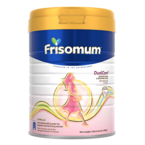Postpartum Diet Guide: What Foods to Eat & What to Avoid After Giving Birth
Congratulations on the birth of your new bundle of joy! Now that your .... read more

Every woman wishes for a healthy and smooth pregnancy journey. The journey to motherhood can be filled with joy and anticipation, but it’s also not uncommon to encounter some unexpected bumps along the way in the form of pregnancy-related discomforts and complications. Ensure a healthy and smooth pregnancy journey with these tips to manage common issues that may arise so you can enjoy this precious phase of motherhood with confidence.
Stomach pain is one of the most common discomforts that come with pregnancy. After all, the womb is expanding, and ligaments stretch to accommodate.1,2 As a result, many mums-to-be report feeling a sharp cramp on one side of their stomach. Other potential causes include constipation, trapped wind, or even poor posture.1,2 Considering these factors, adopting a proper diet, exercising regularly and paying attention to posture can be helpful steps towards managing stomach pain.
The pain will usually subside over time, but if you experience the following symptoms, please consult your physician1:
It's common for pregnant women to seek pain relief, but always consult your doctor for safety assurance.
Morning sickness is a common sign during the first trimester, and is thus named as many women often experience it early in the day (though it can occur at any time).3 In most cases, it makes you want to throw up or feel nauseated. The exact cause of morning sickness is unknown, but here are some suggestions that might help manage the symptoms:
While many experience occasional nausea during pregnancy, some may experience it in a more intense form known as hyperemesis gravidarum.3 This condition involves nausea lasting for several hours a day, with vomiting happening more frequently.3 If you experience persistent nausea or vomiting, it's important to talk to your doctor for personalised advice and support.
Heartburn is yet another common discomfort that comes with pregnancy. As the hormonal balance in your body shifts drastically throughout your pregnancy, it can cause the stomach valve to relax and not close normally.4,5 This allows acidic contents to travel back up the throat, causing an unpleasantly sour taste in your mouth that can induce vomiting. This condition can worsen as the growing uterus presses up into the stomach.4,5
Thankfully, there are many ways to ease heartburn4,5,:
If you have severe symptoms or would like to try medication, please speak with a healthcare provider.
Back pain during pregnancy is a common experience, affecting many women. Several factors contribute to this discomfort such as:
During pregnancy, the ligaments in your body naturally become softer as they stretch to prepare you for labour. That puts a strain on the joints of the lower back and pelvis, which can cause backache. The extra weight of your uterus and the increasing size of the hollow in your lower back can also add to the problem.
But don’t worry, here are several things you can do to help prevent backaches, and cope with them if they do occur.8,9
One of the proven things to help with backaches is a firm mattress. If your mattress is too soft, invest in a firm mattress topper made of latex, memory foam, or high-density polyfoam. These toppers are specifically designed to add firmness and support to your existing mattress. You can also invest in a maternity body pillow to help you distribute your weight more evenly and reduce pressure points. The unique shape of a maternity body pillow can help to provide support for your belly, back, hips, and legs. This can help you find a comfortable sleeping position, especially as your belly grows and traditional sleeping positions become more challenging.
There are also a variety of activities that can help ease the pain of backaches. If you prefer to exercise from the comfort of your home, there are several easy, low-impact exercises you can try out. Check out our article Easy Pregnancy Exercises at Home to get started on your pregnancy workout routine!
Some women experience thinning hair during pregnancy and after pregnancy. Hair loss during pregnancy is typically due to a decrease in oestrogen, which may happen as a result of stopping the oral contraceptive pill or a hormonal fluctuations during pregnancy.10
It's also quite common for new mums to experience hair loss after pregnancy when their oestrogen returns to normal levels.10,11 This causes the additional hair from the growth phase to change to the resting phase, which then falls out more than usual, until around 3 to 4 months after childbirth.11 This hormone-related hair loss is usually nothing to worry about, as your hair typically regrows and returns to its normal state after some time.
Some tips that may help include:
If you notice a significant increase in hair loss or a delay in hair regrowth, consult your doctor for a professional evaluation and guidance.
Gestational diabetes (GDM) develops during pregnancy when your body struggles to use insulin effectively. Normally, the hormone insulin helps your cells absorb glucose (sugar) from the blood for energy. However, during pregnancy your body may not be able to produce enough insulin to meet your extra needs, leading to high blood sugar levels.12 While this type of diabetes usually resolves after delivery, it can pose health complications for both mother and child if left unmanaged during pregnancy12:
On the mother
On the child
Fortunately, gestational diabetes can be managed effectively with a healthy diet, exercise, and sometimes medication.13 Early detection and treatment are crucial to minimise risks of pregnancy complications for both mother and child. But how do you know what are the warning signs to look out for? Gestational diabetes can often show up as the following symptoms12:
It's important to remember that some of these symptoms are common during pregnancy and not necessarily a sign of gestational diabetes. To get a clearer picture of whether the symptoms you're experiencing are related to gestational diabetes or other pregnancy complications, we recommend seeking professional advice from your doctor. Additionally, you can also discuss the possibility of getting a glucose screening test done to dispel any concerns you may have about these symptoms being warning signs of a potentially more serious pregnancy complication.
A glucose screening test is a routine pregnancy test that checks for gestational diabetes. It checks for higher-than-normal levels of glucose, more commonly known as blood sugar. Having higher-than-normal levels of glucose could mean you are at risk for developing gestational diabetes.
Physicians recommend that all women should be screened for gestational diabetes, because it's one of the most common type of pregnancy complication. Left untreated, it could lead to a number of problems in the future.
Implementing simple lifestyle changes can help you gain control over the problem. By making these adjustments, you not only work towards a smoother pregnancy but also contribute to a healthier outcome for your child. To help you reduce the risk of developing gestational diabetes, why not check out our article on Why A Low GI Diet Is Beneficial During Pregnancy to discover how GI diets can help you manage blood sugar levels and enjoy a healthy pregnancy.
It is always good to ensure you have the right nutritional support during your pregnancy journey. According to Malaysia’s Recommended Nutrient Intake (RNI), 2017,16 pregnant mothers require sufficient doses of calcium, folic acid, vitamin D and iron, amongst other macro & micronutrients. Getting the right nutrient combination helps minimise some of the potential problems you may face. Choose a nutritional supplement that’s high in calcium and low in GI (Glycaemic Index) value such as Friso® Gold Mum to be your nutrition partner.
Friso® Gold Mum, our preferred prenatal milk for mothers, retains the natural nutrients of the milk to support you through your pregnancy journey such as:
Vitamin D - Necessary for the absorption and utilisation of calcium and phosphorus.17
Calcium - Helps in the normal growth and development of bones and teeth.18
Vitamin B12 - Needed for red blood cell production and the healthy functioning of the nervous system.19
Folic Acid - Folic acid is essential for growth and division of cells. Folate plays a role in the formation of red blood cells. Folate helps to maintain the growth and development of the foetus.20
Iodine - Essential for the formation of thyroid hormones, which supports brain development.21
Low glycaemic index - The glycaemic index (GI) is a rating system for foods containing carbohydrates.22 It shows how quickly food affects your blood sugar (glucose) level when eaten on its own. The low glycaemic index (GI) could help the mother avoid being overweight during pregnancy, thus avoiding further complications such as gestational diabetes.23
Friso® Gold Mum consists of essential nutrients which are formulated with DualCare+™, to support mum's and their children's daily needs. Read more on what mums should drink during pregnancy.
While the list above covers most of the complications pregnant women face, some mothers still encounter less serious, but equally challenging, symptoms during their pregnancies. If you're still unsure about how to deal with issues such as pregnancy leg cramps, the constant tiredness and more, our article A Guide To Managing Pregnancy Symptoms may be just what you need!
Friso® Gold Mum, in support of healthy, happy pregnancy journeys.
References


